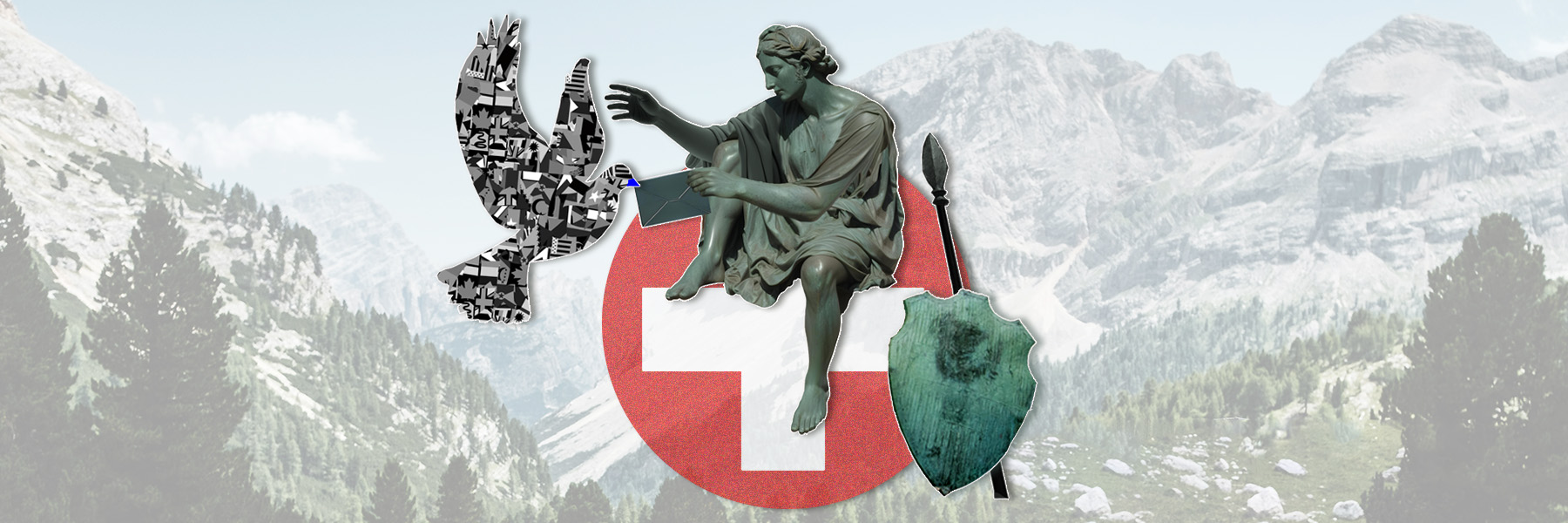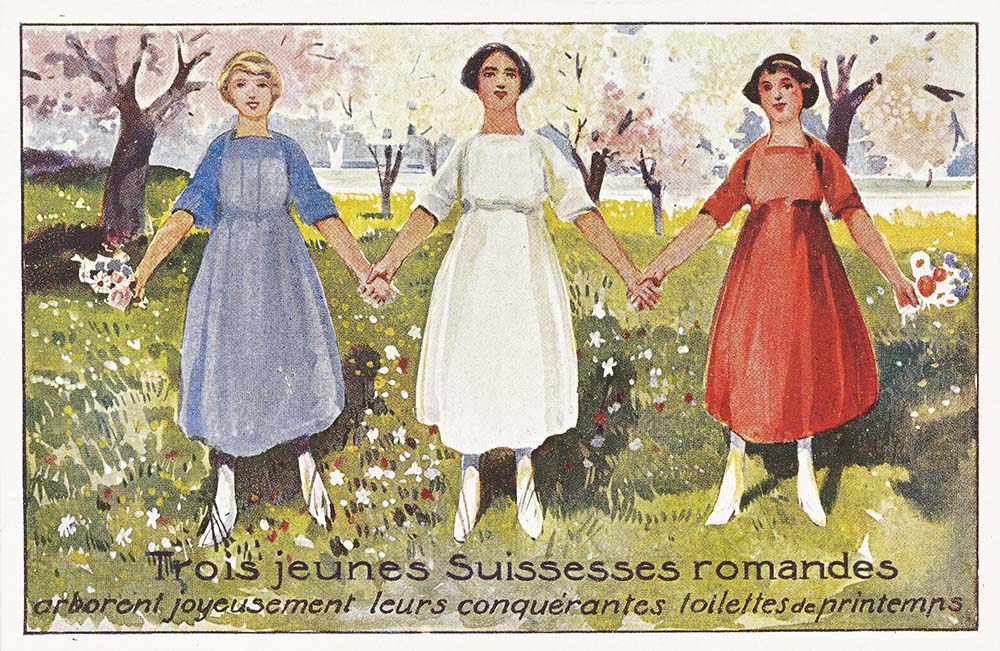
How Switzerland protected Latin American interests in Nazi Europe

Switzerland represented interests of Latin American countries during the Second World War. This helped it shape a global diplomatic network, much of which is still in place today.
“On our part, we will send a note announcing that, as our offices in Germany will be closed on November 15, it will no longer be possible to take care of your interests, and we recommend that you contact the American authorities if necessary.”
The note comes from an internal dossier External linkfrom the foreign ministry. It’s dated November 1945, right after the end of the Second World War, and ends a little-known Swiss role: that of protector of 17 Latin Allied interests in Axis countries.
Amid the collapse of international relations brought on by the conflict, Swiss neutrality became a strategic asset for the Alpine country. While countries in Latin America severed ties with the Axis powers – Germany, Italy and Japan, and occupied nations such as France – Bern assumed the role of guardian of their interests in Europe.
Pressed by the United States to ensure hemispheric security and align with the Allied war effort, Latin American countries, including Uruguay, Brazil and Mexico, broke off relations with the Axis powers. This decision, however, left millions of immigrants and economic interests in the warring countries without diplomatic representation.
To fill this gap, Switzerland was chosen as a protecting power, taking on consular and administrative responsibilities for both sides.
Between 1939 and 1945, Swiss diplomats operated in Berlin, Rome and in the part of France occupied by Germany, as well as in occupied cities such as Copenhagen. They handled consular tasks, assisted citizens, and maintained secret communications on behalf of Latin American governments, expanding their influence and protecting their interests in the region.
“Latin America was an important economic market, and a significant number of Swiss citizens living abroad resided there. Representing Latin American interests in Europe gave the Swiss government an important role, ensuring economic relations and the protection of its citizens,” explains Stella Krepp, associated researcher at the Department of Iberian and Latin American History at the University of Bern.
Thus, discreetly, Switzerland expanded its global reach, using diplomacy as a shield to protect distant allies while strengthening its own network of influence, which continues to this day, according to specialists.

More
Need a diplomatic messenger? Switzerland is eager to help
What representation means
The practice of a protecting power, carried out by Switzerland during the conflict in Europe, is defined as acting on behalf of other states that had broken diplomatic relations or lacked direct channels of communication.
In such situations, Switzerland mediated messages between governments, safeguarded embassy property and even issued documents such as passports and visas. It was a discreet but essential role that made the country a reliable intermediary during international crises.
This tradition began during the Franco-Prussian War (1870–71), when the Alpine country represented the interests of Bavaria and the Grand Duchy of Baden in France. It gained relevance during the First World War, when Switzerland exercised about 36 mandatesExternal link.
“The practice of ‘protecting powers’ became more common after the First World War and was formalised in the Geneva Convention on Prisoners of War, the 1929 Convention Relative to the Treatment of Prisoners of War, the third edition of a document initially signed in 1864 and a cornerstone of humanitarian law,” says Paula Vedoveli, a professor who studies the subject at the School of International Relations at the Getulio Vargas Foundation in Brazil.
Read more on how propaganda flooded Switzerland in the First World War:

More
How propaganda flooded Switzerland during WWI
Its peak came during the Second World War, when Switzerland accumulated more than 200 mandates representing around 42 countries, according to Diplomatic Documents of Switzerland (Dodis)External link, a historical research project that gathers official documents on Switzerland’s foreign policy and international relations.
It was an unprecedented situation.
Geneva and Bern became diplomatic hubs, mediating the interests of both Axis and Allied countries, turning Swiss neutrality into not only a political hallmark but also a strategic survival asset, protecting the interests of Switzerland and Swiss citizens abroad.
Latin America and Switzerland
With the entry of the United States into the war in December 1941, several Latin American governments adhered to the Declaration of the United Nations, signed in January 1942, officially aligning themselves with the Allies.
Even so, some of the most influential countries in the region, including Brazil, Argentina and Chile, showed resistance due to commercial or even ideological commitments with Axis powers.
“Brazil was the only Latin American country to send both air and ground troops to Europe, while also waging naval war against German submarines in the South Atlantic. Chile followed in 1943, and Peronist Argentina in 1945, shortly before the Allied victory in Europe,” notes Krepp, highlighting that the Argentine government at the time was sympathetic to European fascism.
Instead of demanding that South American states declare war, the Roosevelt administration in the United States opted for a more gradual strategy: it pressured them to sever diplomatic and economic ties with the Axis powers.
This rupture created a diplomatic vacuum that Switzerland stepped in to fill, reinforcing a model of near-neutrality as a protecting power. In total, about 40% of Switzerland’s mandates came from Latin American countries.
“Such a role seeks to facilitate dialogue and safeguard core principles of humanitarian law. This work was marked by challenges, including the willingness of parties to recognise the role of a protecting power and comply with its demands on behalf of the state it represented,” says Vedoveli.
Read more: How Switzerland could help restore dialogue between the US and Cuba:

More
Cuban diplomats eye Switzerland in bid to ease US economic pressure
For Krepp, however, Swiss neutrality is seen today differently from how it was perceived at the time, when Switzerland maintained a certain degree of closeness with Germany during the war.
“I don’t believe one can argue that Switzerland remained neutral [during the war], since it continued to maintain close economic relations with Germany. It was particularly important in gold transactions and in providing a market for products essential to the war industry, such as oil,” she says.
Swiss discretion
The supposed neutrality Switzerland offered to Latin American countries thus opened the way for the country to expand its network of influence beyond Europe.
Although multilateral bodies such as the United Nations and the World Trade Organization (WTO) occupied this mediating role in the postwar world, Swiss influence remains in Latin America to this day.
“Switzerland has been an important actor in Latin America thanks to its offer of what is called good offices, as a mediator,” says Krepp. “It played a crucial role in Cuba, representing US interests there, and continued to act as mediator in inter-American conflicts, such as in 2024 between Mexico and Ecuador. This gives it an outsized influence in Latin American politics.”
For Vedoveli, the effective performance of Switzerland as a protecting power during the Second World War projected its legacy into Latin America in the immediate postwar period and during the Cold War, when the country was called upon as an observer and mediator in regional conflicts, even if discreetly.
“The country has built a model of action through practice, where the success of its work can shape expectations about the scope and effectiveness of future activities and episodes, and in this case, discretion is also an asset,” she adds.
Edited by Virginie Mangin/ts

More
Our weekly newsletter on geopolitics

In compliance with the JTI standards
More: SWI swissinfo.ch certified by the Journalism Trust Initiative




























You can find an overview of ongoing debates with our journalists here . Please join us!
If you want to start a conversation about a topic raised in this article or want to report factual errors, email us at english@swissinfo.ch.